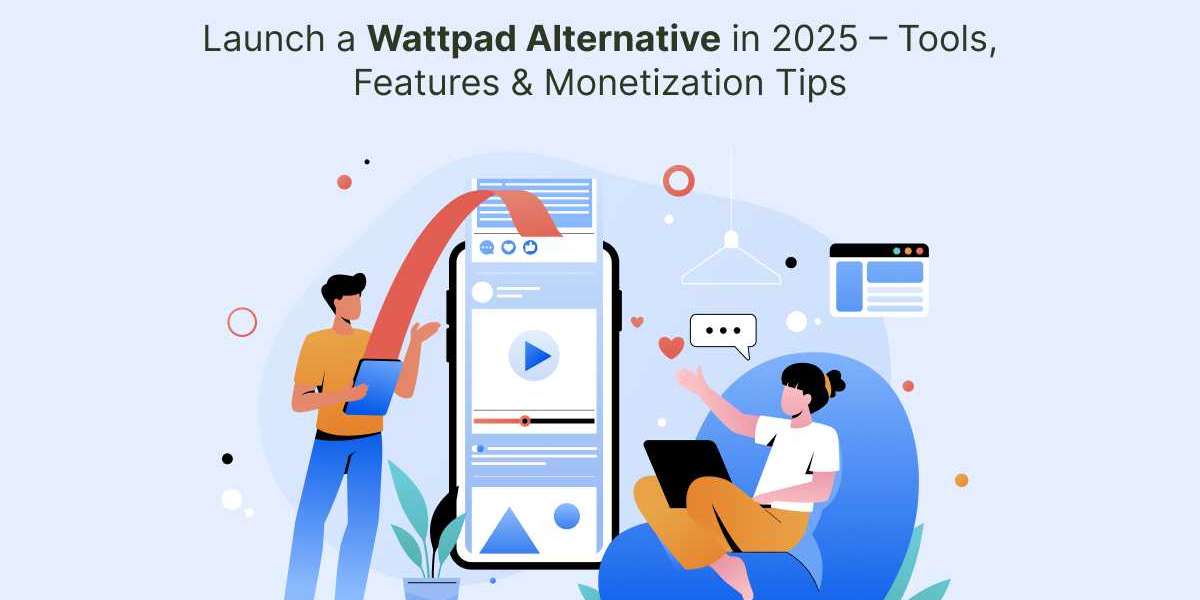The rise of digital reading apps has transformed how stories are created, shared, and consumed globally. Wattpad pioneered this space by offering a community-driven storytelling platform where authors could publish and readers could discover stories instantly. In 2025, however, the market is wide open for new platforms that blend creativity, technology, and monetization.
Whether you're a startup or an established brand aiming to enter this space, launching a Wattpad alternative is a smart move—if you have the right tools, features, and go-to-market strategy. Here’s everything you need to build a compelling storytelling app and community in 2025.
Why Build a Wattpad Alternative?
While Wattpad remains popular, several gaps in personalization, author monetization, and platform control make room for competitors. A well-built reading app tailored to specific audiences—romance fans, sci-fi lovers, or regional language readers—can quickly attract loyal communities.
Entrepreneurs and publishers are exploring Wattpad-like platforms to:
- Empower independent writers
- Control monetization strategies
- Target niche audiences
- Own first-party user data
- Build branded storytelling ecosystems
Core Features of a Successful Reading App
To stand out, your Wattpad alternative should offer a mix of user-friendly design, creator tools, and interactive features. Key modules to include:
1. Multi-role User Panels
- Reader Panel: User-friendly reading interface, bookmarks, comments, likes, downloads.
- Writer Panel: Story creation dashboard, chapter drafts, writing stats, publishing tools.
- Admin Panel: Manage users, stories, content moderation, payments, analytics.
2. Story Publishing System
Enable writers to upload stories with chapters, choose genres/tags, add cover art, and set visibility (free, premium, private). Let them schedule chapters or publish instantly.
3. Interactive Reader Experience
- Day/night modes
- Font size control
- Chapter-wise commenting
- Story rating and review system
- Personalized recommendations based on genres or past reading behavior
4. Advanced Search Discovery
Use AI-driven algorithms to recommend content, trending stories, editor’s picks, or location/language-based filters. Improve discoverability for both old and new writers.
5. Community Engagement Tools
- Follower system for writers
- Comment threads and forums
- Badges for top contributors
- Monthly writing challenges or story contests
6. Content Moderation Reporting
To maintain content quality and legal compliance, integrate:
- AI-based plagiarism detection
- Manual story approval systems
- User reporting and review workflows
7. Push Notifications Real-Time Updates
Notify users about new chapters, responses to their comments, story recommendations, or community updates to boost retention and session times.
Monetization Strategies for Storytelling Apps
Building a profitable Wattpad alternative requires a smart monetization approach that benefits both the platform and the creators. Here are common and effective revenue models:
- Freemium Subscriptions
Offer free reading with ads, while allowing users to upgrade for an ad-free experience, early chapter access, or bonus content.
- In-App Purchases
Let users pay micro-fees to unlock premium chapters, exclusive stories, or author QA sessions.
- Tipping/Donation System
Use in-app currency to tip favorite authors, support indie creators, or unlock story bundles.
- Ad Monetization
Run ads within free stories and share revenue with creators based on views or engagement.
- Branded Contests Merchandise
Collaborate with publishers or sponsors to host writing contests or sell limited-edition story merchandise and NFTs.
Technology Stack Tools to Use
Here’s a simplified breakdown of the tools required for building your Wattpad alternative:
- Frontend: React Native or Flutter (for cross-platform mobile apps)
- Backend: Node.js / Laravel / Django
- Database: MongoDB / PostgreSQL (to store story and user data)
- Cloud Storage: AWS S3 or Firebase Storage (for images, cover arts, backups)
- Push Notifications: Firebase Cloud Messaging
- Real-Time Chat/Updates: Socket.io or Firebase Realtime Database
- Payment Gateway: Stripe, Razorpay, or PayPal
- Analytics: Mixpanel or Google Analytics for Firebase
To ensure performance and scalability, partner with a reliable clone app development company that has experience in content-based or community apps.
Challenges in Building a Storytelling App
While the market opportunity is strong, there are technical and business challenges to anticipate:
- Content Moderation: Prevent plagiarism and inappropriate uploads with a mix of AI and manual review.
- Scalability: Your app must handle thousands of concurrent users and dynamic data loads as it grows.
- Monetization Balance: Too many ads or paid barriers may alienate users; find a balance between free and premium content.
- Community Building: Retaining authors and readers long-term requires consistent engagement through features, updates, and recognition.
- Data Protection: Secure personal data and ensure compliance with regulations like GDPR.
Partnering with a seasoned on demand app development team helps you navigate these obstacles smoothly and launch a polished product faster.
Trends Shaping Digital Reading in 2025
Several trends are influencing how new reading platforms are designed:
- AI-Enhanced Story Recommendations: Personalization engines powered by machine learning improve reader satisfaction and retention.
- Voice-Based Narratives: Text-to-speech features and audio stories are gaining popularity, especially among mobile-first audiences.
- Gamified Reading: Badges, levels, and reading streaks keep users hooked and returning.
- Decentralized Publishing (Web3): Blockchain and NFTs enable authors to own and monetize content without middlemen.
Understanding and integrating these trends will give your app a future-proof edge.
FAQs
1. Is it expensive to launch a Wattpad clone app?
Not necessarily. A white-label storytelling app can reduce development costs by up to 60%, making it affordable for startups.
2. Can I allow both free and paid stories on the platform?
Yes. You can implement a hybrid model where some stories are freely accessible, while others require in-app purchases or subscriptions.
3. How can writers monetize their content?
Authors can earn through paid chapters, ad revenue sharing, tipping, and sponsored content depending on your monetization setup.
4. How do I attract writers to join my platform?
Offer them better revenue sharing, flexible publishing tools, and more visibility than larger platforms.
5. Can I customize the app with my own branding?
Absolutely. Clone apps are white-labeled and can be fully rebranded with your logo, color scheme, and domain.
6. Is content moderation automated?
You can integrate both AI-based tools for plagiarism and keyword detection as well as manual review systems for sensitive content.
7. Does the app support multilingual content?
Yes. Multi-language support is essential for regional expansion and better reader engagement.
8. How long does it take to launch such an app?
Depending on customization needs, a ready-made Wattpad alternative can be launched in 3 to 5 weeks.
Conclusion
Launching a Wattpad alternative in 2025 is not only viable—it’s an opportunity to build a thriving storytelling community that caters to evolving reader and writer needs. By partnering with a clone app development company and focusing on the right tech stack, engaging features, and fair monetization models, you can carve out a profitable niche in the global reading ecosystem.








